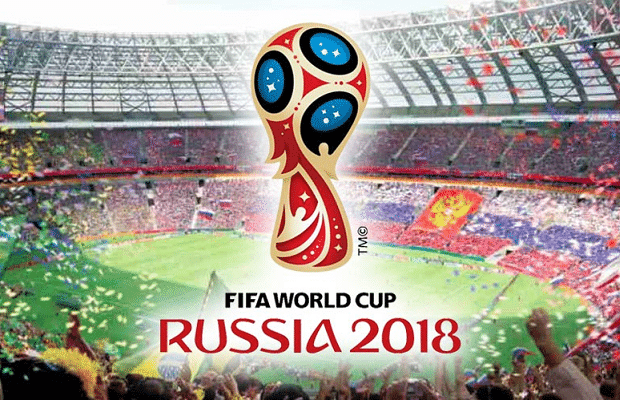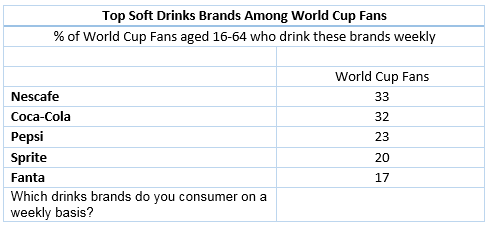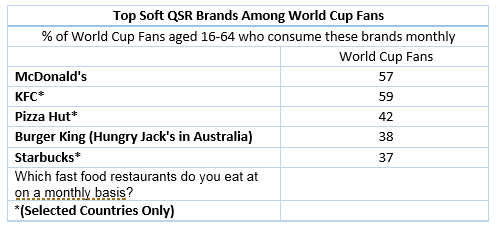
GlobalWebIndex looked into brand consciousness/loyalty, engagement with ads and insights around the main sponsors for the 2018 tournament fast approaching.
A global survey of 34,390 internet users by GlobalWebIndex reveals:
- 32% of FIFA World Cup fans consume sponsor Coca-Cola globally; 57% of fans visit fellow sponsor McDonald’s at least monthly, highlighting the bottom line contribution of TV sponsorship.
- Globally, 43% discover brands through TV ads, and 46% buy from brands they have seen advertised. This compares to 35% who discover brands through online ads
Coca-Cola a main sponsor, is NOT the most popular soft drink brand among FIFA World Cup fans, the top spot goes to Nescafe consumed by exactly one third of the global audience. - As the sugar tax comes into force just 20% of UK World Cup fans drink Coca-Cola weekly.
- McDonald’s leads the global fast food market, but has close competition from KFC and Pizza Hut, visited by 59% and 42% of the fan base respectively.
- 4 in 10 World Cup fans bought an Adidas product in the last 1-2 years, the same proportion use VISA and 1 in 10 own or have owned a Hyundai
- 54% of FIFA fans claim to be brand-conscious and 63% are loyal to brands once they have engaged with them.
- UK brand-consciousness dips to just over a third (34%). This may well be a contributing factor to Europe being the lowest region for brand-consciousness at 40%.
GlobalWebIndex reveals 32% of FIFA World Cup fans consume Coca-Cola, the official sponsor, each week. The study also reveals 57% of fans visit fellow sponsor McDonald’s at least monthly, highlighting the bottom line contribution of TV sponsorship.
Both companies have sponsored related global sporting events in the past including the Olympics and the 2014 FIFA World Cup. In the latter, these brands were joined by Adidas, Hyundai-Kia and VISA.
The findings reveal 4 in 10 World Cup fans bought an Adidas product in the last 1-2 years, the same proportion use VISA and 1 in 10 own or have owned a Hyundai.
By comparison, just 37% of Winter Olympics fans eat at McDonald’s monthly and just 29% drink Coca-Cola on a weekly basis.
Global competition
While the main sponsors enjoy strong affinity with World Cup fans, they also face stiff competition from international rivals. Coca-Cola, for instance, is not the most popular soft drink brand among World Cup fans globally.
Of the drinks brands tracked by GlobalWebIndex, Nescafe takes the top spot, consumed by exactly one third of the global audience (33%). While Coca-Cola isn’t consumed by as many fans weekly, the popularity of its subsidiary brands Fanta (17%) and Sprite (20%) suggest the group’s dominance around the World Cup.

While McDonald’s appears to lead the global fast food market among World Cup fans, it faces close competition from the likes of KFC and Pizza Hut, visited by 59% and 42% of the fan base respectively.

Brand consciousness
The effectiveness of World Cup sponsorship is reflected in the brand consciousness of its global audience.
At this level 54% of FIFA fans claim to be brand-conscious and 63% state: “once I find a brand I like I tend to stick to it”, implying considerable levels of brand loyalty.
At a local level, in the UK brand-consciousness dips to just over a third (34%). This may well be a contributing factor to Europe being the lowest region for brand-consciousness at 40%. It’s worth noting as the sugar tax comes into force that just 20% of UK World Cup fans drink Coca-Cola weekly.
At the opposite end of the spectrum, Latin America, which has the highest rates of viewership, is also the most brand-conscious at 59%, with Mexico (72%) and Argentina (66%) contributing significantly to this result. Interestingly, FIFA World Cup fans in the U.S. and Russia rank equally at 49%.
One manifest truth is the power of TV in driving brand awareness. Globally, 43% discover brands through TV ads they have seen, and 46% tend to buy from brands they have seen advertised. This compares to 35% who discover brands through online ads.
Source: Global Web Index
